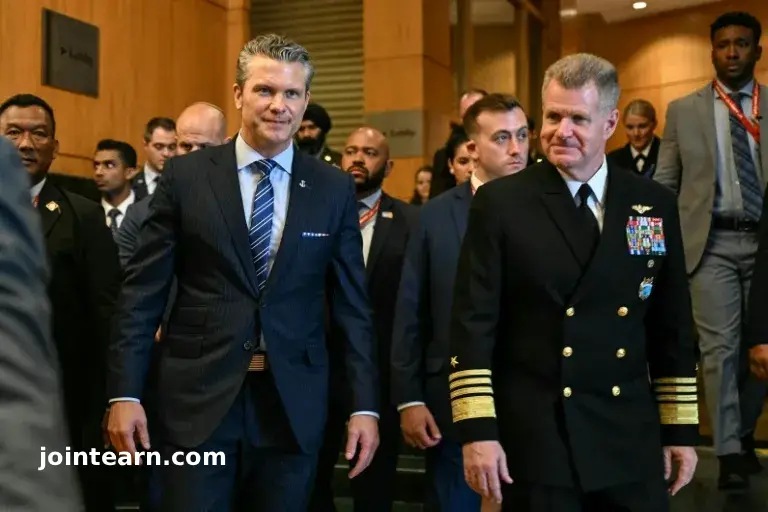
KUALA LUMPUR, Malaysia — October 31, 2025 — Chinese Defence Minister Dong Jun urged the United States to build “mutual trust” and pursue peaceful coexistence with China but delivered a firm warning over Taiwan, underscoring enduring tensions between the world’s two largest powers despite recent diplomatic overtures.
Dong met U.S. Defence Secretary Pete Hegseth on the sidelines of the ASEAN Defence Ministers’ Meeting (ADMM) in Malaysia, just a day after Chinese President Xi Jinping and U.S. President Donald Trump held their much-anticipated summit in South Korea.
Beijing Urges ‘Caution’ on Taiwan
In a statement released by China’s Ministry of Defence, Dong emphasized that “the unification of the two sides of the Taiwan Strait is an irresistible historical trend.” He cautioned Washington to “be cautious in its words and deeds” on the Taiwan issue and to “take a clear-cut stance firmly opposing ‘Taiwan independence.’”
Beijing considers Taiwan a breakaway province that must eventually be reunified, by force if necessary. The United States, while officially recognizing only Beijing under the “One China” policy, remains Taiwan’s largest arms supplier and a key strategic backer.
The Chinese defence minister said that both nations’ defence departments “should take concrete actions to implement the consensus reached by the heads of state” and work to “enhance trust and dispel uncertainty.” He called for a bilateral military relationship “characterized by equality, respect, peaceful coexistence, and stable positive momentum.”
A ‘Good and Constructive’ Meeting Amid Tense Backdrop
U.S. Defence Secretary Pete Hegseth described the talks as “good and constructive,” signaling cautious optimism after years of military tension in the Indo-Pacific.
“I highlighted the importance of maintaining a balance of power in the Indo-Pacific and emphasized U.S. concerns about China’s activities in the South China Sea, around Taiwan, and toward our allies and partners,” Hegseth said in a post on social media platform X.
The meeting marks the latest in a series of high-level engagements between Beijing and Washington aimed at stabilizing relations, which have been strained by trade disputes, military close encounters, and Taiwan arms sales.
Still, analysts noted that Dong’s firm stance on Taiwan and Hegseth’s reaffirmation of U.S. commitments in Asia underscore the fragile nature of this diplomatic reset.
Balancing Power in the Indo-Pacific
Hegseth, who earlier this year warned that China was “credibly preparing” to use military force to alter Asia’s balance of power, has faced criticism from Beijing for what it views as inflammatory rhetoric.
However, his tone on Friday was more measured.
“The United States does not seek conflict,” he said, “but will continue to stoutly defend its interests and ensure it has the capabilities in the region to do so.”
The comments reflect Washington’s dual-track approach — maintaining open communication channels while reinforcing deterrence through military partnerships and forward deployments in the South China Sea and East China Sea.
China, meanwhile, claims nearly all of the South China Sea, despite overlapping claims from Vietnam, the Philippines, Malaysia, Brunei, and Indonesia. The U.S. regularly conducts freedom of navigation operations in the contested waters, drawing protests from Beijing, which accuses Washington of militarizing the region.
Strengthening U.S.-India Defence Cooperation
During his Malaysia visit, Hegseth also met with Indian Defence Minister Rajnath Singh, where both sides signed a 10-year strategic cooperation deal that will expand joint training, intelligence sharing, and weapons procurement.
Under the agreement, India will acquire U.S.-made patrol aircraft, combat vehicles, and missile systems, further cementing defence ties between the two democracies.
“Our defence ties have never been stronger,” Hegseth said, calling the U.S.-India partnership a “pillar of stability in the Indo-Pacific.”
The announcement comes as Washington deepens security cooperation through the Quad alliance — involving the U.S., India, Japan, and Australia — and bolsters regional defense frameworks in response to China’s expanding military footprint.
Outlook: Dialogue Amid Strategic Rivalry
Dong’s call for trust and dialogue with the U.S. reflects Beijing’s desire to project stability after months of economic pressure and diplomatic friction. Yet his firm remarks on Taiwan underscore that the issue remains a red line for China, and a potential flashpoint that could derail efforts to stabilize the broader U.S.-China relationship.
As both sides reaffirm their commitment to dialogue, the Indo-Pacific balance of power remains precarious, with ASEAN nations increasingly caught between competing superpower influences.


Leave a Reply